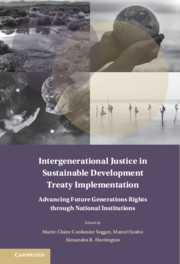 Intergenerational Justice in Sustainable Development Treaty Implementation
Intergenerational Justice in Sustainable Development Treaty Implementation from Promoting the Voice of the Public
Published online by Cambridge University Press: 15 October 2021
Quickly, the term ‘sustainable development’ was spread worldwide and became fashionable. The original objective of the Brundtland Report – to show that developing States could strive for economic development, but were not obliged to sacrifice their environmental assets to that development – was soon set aside. ‘Sustainable development’ was declared to be a political orientation based on three pillars, economic development, social progress and environmental protection. This led first to the suggestion that progress should be achieved in all three sectors, economy, social issues and environmental protection. Economic operators then tried to interpret the concept in the sense that measures in one sector should only be allowed when they satisfied the needs of the other two sectors. In practice, this was aimed at the environmental sector, where protection measures were only possible where they contributed to economic growth and the creation of jobs; in contrast, it was not considered necessary that measures to stimulate economic development – trade agreements, tax reliefs, investment programs and many others – were also beneficial for the environment.
To save this book to your Kindle, first ensure [email protected] is added to your Approved Personal Document E-mail List under your Personal Document Settings on the Manage Your Content and Devices page of your Amazon account. Then enter the ‘name’ part of your Kindle email address below. Find out more about saving to your Kindle.
Note you can select to save to either the @free.kindle.com or @kindle.com variations. ‘@free.kindle.com’ emails are free but can only be saved to your device when it is connected to wi-fi. ‘@kindle.com’ emails can be delivered even when you are not connected to wi-fi, but note that service fees apply.
Find out more about the Kindle Personal Document Service.
To save content items to your account, please confirm that you agree to abide by our usage policies. If this is the first time you use this feature, you will be asked to authorise Cambridge Core to connect with your account. Find out more about saving content to Dropbox.
To save content items to your account, please confirm that you agree to abide by our usage policies. If this is the first time you use this feature, you will be asked to authorise Cambridge Core to connect with your account. Find out more about saving content to Google Drive.